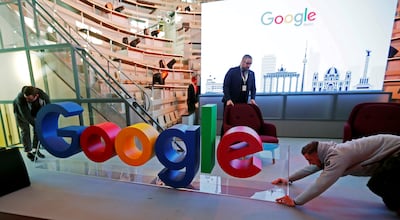A federal judge is set to hear closing arguments on Friday before determining how he will punish Google for illegally maintaining a search engine monopoly.
The case, brought by the US government, could throw Google's expansion plans into turmoil just as it looks to strengthen its artificial intelligence offerings.
District Judge Amit Mehta last year sided with the US Justice Department and ruled that Alphabet-owned Google had been illegally exploiting its dominance in the search sector to stifle competition, ultimately harming consumers with less choice.
Last month, the trial moved into a second phase, with Mr Mehta listening to technology executives, economists and regulatory experts as he considers what penalty he will levy against Google.

His decision could be one of the most consequential in technology regulation since 1982, when the Department of Justice broke up AT&T's monopoly through its Bell telephone system. Another landmark case came in 2000 when a judge found that Microsoft breached antitrust laws by engaging in predatory practices.
The Justice Department wants Mr Mehta to enact far-reaching penalties that would be a warning to other companies.
Prosecutors want Google to divest its popular Chrome browser from its portfolio, and it wants the tech giant to share coveted search data with competitors.
The department also wants to end the lucrative deals arranged by Google where it pays companies such as Samsung and Apple to make Google's search tool the default option on devices.
Mark MacCarthy, a senior fellow at the Institute for Technology Law and Policy at Georgetown University in Washington, has studied antitrust policy for several decades. He said Google’s ubiquitous presence presents the judge with a unique challenge.

Mr MacCarthy voiced concerns that a court-ordered requirement for Google to share users' search data could see companies exploit that information without people's consent.
Forcing Google to share data "would require unprecedented co-operation among the courts involved", he said. “My view is that this would be better done by a new digital regulatory agency.”
Google has been pushing its own proposed remedies. These are far lighter than those proposed by the department, including a solution that would give users the ability to change their default search provider at least every 12 months.
“Our proposal allows browsers to continue to offer Google Search to their users and earn revenue from that partnership … but it also provides them with additional flexibility,” Google said, adding that it would give options to hardware sellers to make deals with other search engines.
“Browser companies like Apple and Mozilla should continue to have the freedom to do deals with whatever search engine they think is best for their users.”
Google has also proposed what it described as a “robust mechanism” to ensure that it would comply with the proposed remedy.

The case playing out in Washington is not the only legal battle Google is fighting. The tech giant is appealing against part of a recent ruling that found it unfairly used its internet advertising dominance and crushed competitors.
In that case, both Google and the government are trying to shape what remedy will ultimately be decided.
The worst-case scenario for Google in that case could be that it is forced to spin off its advertising technology division, which would mean the loss of a significant amount of revenue for the search engine.
Perhaps more importantly, whatever ensues could have ripple effects across the technology ecosystem revolving around Google.
Eric Mulheim, chief financial officer of Mozilla, maker of the Firefox web browser, spoke about that shortly after testifying in the antitrust remedy trial.
“We believe the court should ensure that small and independent browsers are not harmed in any final remedies,” Mr Mulheim said, referring to Mozilla's paid partnership with Google that could be threatened by what the judge decides.
“Without this, we risk trading one monopoly for another, and the vibrant, people-first web we’ve spent decades fighting for could begin to fade."
In a separate court filing, Mozilla pushed for a “more tailored” approach to whatever remedies are decided on, that will not affect independent web browsers.
Even with so much legal scrutiny, in terms of influence, market share and revenue, Google is still a force to be reckoned with. To regulators, that is the whole point, and the legal walls seem to be closing in.
On Friday, however, both Google and the department have one more chance to influence the final decision as Mr Mehta considers closing arguments.






